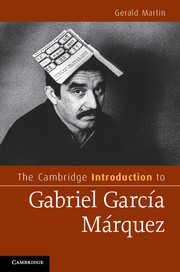Book contents
- Frontmatter
- Contents
- Introduction
- Chapter 1 The life and work in historical context
- Chapter 2 Early short stories, journalism and a first (modernist) novel, Leaf Storm (1947–1955)
- Chapter 3 The neorealist turn
- Chapter 4 One Hundred Years of Solitude (1967)
- Chapter 5 The Autumn of the Patriarch (1975)
- Chapter 6 Chronicle of a Death Foretold (1981)
- Chapter 7 Love in the Time of Cholera (1985)
- Chapter 8 More about power
- Chapter 9 More about love
- Chapter 10 Memoirs
- Conclusion
- Notes
- Further reading
- Index
- References
Chapter 3 - The neorealist turn
In Evil Hour, No One Writes to the Colonel and Big Mama’s Funeral (1956–1962)
Published online by Cambridge University Press: 05 June 2012
- Frontmatter
- Contents
- Introduction
- Chapter 1 The life and work in historical context
- Chapter 2 Early short stories, journalism and a first (modernist) novel, Leaf Storm (1947–1955)
- Chapter 3 The neorealist turn
- Chapter 4 One Hundred Years of Solitude (1967)
- Chapter 5 The Autumn of the Patriarch (1975)
- Chapter 6 Chronicle of a Death Foretold (1981)
- Chapter 7 Love in the Time of Cholera (1985)
- Chapter 8 More about power
- Chapter 9 More about love
- Chapter 10 Memoirs
- Conclusion
- Notes
- Further reading
- Index
- References
Summary
At the end of 1953, after completing Leaf Storm, García Márquez moved to Bogotá to work for El Espectador, the great newspaper of his life (with El Heraldo a close second and El Universal third). It was in that great Liberal daily that his first stories were published in 1947; there that he became one of Colombia’s first cinema critics and a stellar reporter during 1954–5; and there that he would choose to publish his classic articles during the 1980–84 period.
After completing Leaf Storm he had written another narrative set in Macondo, ‘One Day After Saturday’. A long story, it had something of the human, geographical and historical spaciousness of a novel, in clear anticipation of One Hundred Years of Solitude itself. Several of the characters of the eventual novel appear in it and there is a ‘magical realist’ plague of birds dropping dead out of the sky. It received a prize in July 1954 for the best short story published in Colombia during the previous year; but by then García Márquez, who was now doing a different kind of journalism, in a city which always made him think in terms hostile to the national establishment, was beginning to conceive of literature in a different, more political way.
- Type
- Chapter
- Information
- The Cambridge Introduction to Gabriel García Márquez , pp. 29 - 44Publisher: Cambridge University PressPrint publication year: 2012
References
- 1
- Cited by

